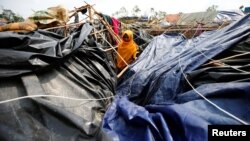The International Federation of Red Cross and Red Crescent Societies warns that hundreds of thousands of Rohingya refugees in Cox’s Bazar, Bangladesh, have little to protect themselves from the ravages of the upcoming cyclone season.
Red Cross officials say most of the 700,000 Rohingya refugees in Cox’s Bazar will have difficulty withstanding the heavy rains and winds almost certain to hit them in a few weeks.
Red Cross spokesman Matthew Cochrane told VOA the refugees are living in squalid, fragile housing, with only rotting bamboo and shredding plastic to protect them.
“When the rains start, they are going to have very little protection. And, if there is a direct hit from a cyclone, which is not unheard of in Cox’s Bazar, they will have next to nothing to protect them against the wind,” Cochrane said.
The cyclone season begins in April and runs through May. Then it reappears in October. Red Crescent staff and volunteers on the ground are racing to protect as many people as possible from potential disaster.
Cochrane said so far, they have distributed tarpaulins, ropes and tools to some 200,000 people. He says they have trained thousands to make their shelters sturdier and safer. He said refugees are receiving training on early warning and on emergency evacuation.
Unfortunately, that is unlikely to be of much use, as there is nowhere for the refugees to go to escape a disaster.
Another concern, he said, is that of waterborne diseases like dysentery and cholera.
“A risk of water-borne diseases or other vector-borne diseases, these are wider concerns in an emergency situation like this, particularly where there is inadequate sanitation or inadequate access to clean water. And, particularly during flooding when sanitation systems are flooded out and you can see large areas of stagnant waters sitting for weeks on an end,” he said.
Cochrane said the first priority is to rebuild, repair, and strengthen existing shelters as quickly as possible.
He said cyclone preparedness training and emergency drills are ongoing. He said water and sanitation, as well as health care facilities are available to assist those in need.





